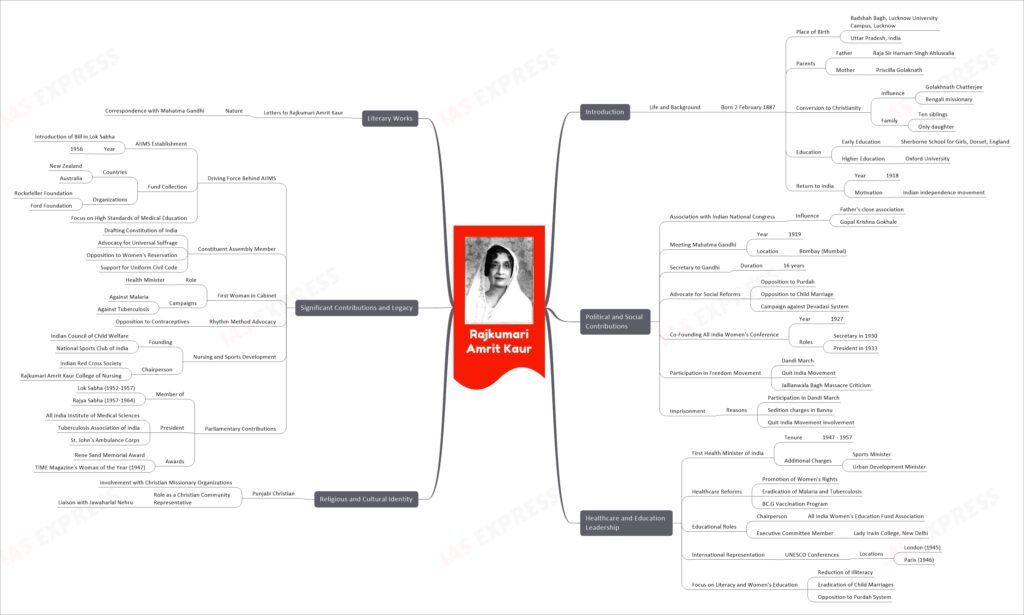Rajkumari Amrit Kaur: A Trailblazer in Healthcare, Education, and Social Reform
Rajkumari Amrit Kaur, born on February 2, 1887, in Badshah Bagh, Lucknow, India, was a remarkable individual whose life and contributions left an indelible mark on the nation. Her journey was characterized by diverse experiences, unwavering commitment to social reform, and an unshakable belief in India’s quest for independence.
This topic of “Rajkumari Amrit Kaur: A Trailblazer in Healthcare, Education, and Social Reform” is important from the perspective of the UPSC IAS Examination, which falls under General Studies Portion.
Life and Background
- Early Years: Rajkumari Amrit Kaur was born to a distinguished family. Her father, Raja Sir Harnam Singh Ahluwalia, and mother, Priscilla Golaknath, instilled in her a strong sense of purpose and duty. Raised amidst ten siblings, she was the only daughter, which influenced her perspective on gender equality.
- Education Abroad: Her educational journey took her from the Sherborne School for Girls in Dorset, England, to the prestigious Oxford University. This exposure to Western education played a crucial role in shaping her worldview.
- Return to India: Amrit Kaur’s return to India in 1918 coincided with the fervor of the Indian independence movement. This pivotal moment would set the stage for her lifelong commitment to the nation’s cause.
Political and Social Contributions
- Association with Indian National Congress: Her father’s close association with the Indian National Congress, along with the mentorship of Gopal Krishna Gokhale, introduced her to the political landscape at a young age.
- Meeting Mahatma Gandhi: In 1919, in Bombay (Mumbai), she had the privilege of meeting Mahatma Gandhi, a fateful encounter that shaped her future.
- Advocate for Social Reforms: Amrit Kaur fervently opposed the Purdah system, child marriage, and campaigned against the Devadasi system, demonstrating her unwavering dedication to social reform.
- Co-Founding All India Women’s Conference: In 1927, she co-founded the All India Women’s Conference and served as its secretary in 1930 and later as president in 1933.
- Participation in Freedom Movement: Amrit Kaur actively participated in iconic events like the Dandi March, the Quit India Movement, and criticized the Jallianwala Bagh Massacre.
- Imprisonment: She faced imprisonment for her involvement in the Dandi March, sedition charges in Bannu, and her active role in the Quit India Movement.
Healthcare and Education Leadership
- First Health Minister of India: In 1947, Amrit Kaur assumed the role of India’s first Health Minister, holding office until 1957, and also serving as the Sports and Urban Development Minister.
- Healthcare Reforms: Under her leadership, she championed women’s rights, spearheaded efforts to eradicate malaria and tuberculosis, and initiated the BCG vaccination program.
- Educational Roles: Amrit Kaur’s dedication to education extended to her roles as chairperson of the All India Women’s Education Fund Association and an executive committee member of Lady Irwin College in New Delhi.
- International Representation: She represented India at UNESCO conferences in London (1945) and Paris (1946), emphasizing literacy and women’s education on the global stage.
Religious and Cultural Identity
- Punjabi Christian: Amrit Kaur’s identity as a Punjabi Christian was significant. She was actively involved with Christian missionary organizations and served as a liaison with Jawaharlal Nehru.
Significant Contributions and Legacy
- Driving Force Behind AIIMS: Her tireless efforts led to the establishment of AIIMS, with the introduction of a bill in the Lok Sabha in 1956. Funds were collected from countries like New Zealand and Australia, as well as organizations like the Rockefeller Foundation and Ford Foundation, to support this endeavor.
- Constituent Assembly Member: Amrit Kaur played a pivotal role in the drafting of India’s Constitution, advocating for universal suffrage, opposing women’s reservation, and supporting a uniform civil code.
- First Woman in Cabinet: As the first woman in the Indian Cabinet, she campaigned against malaria and tuberculosis, and her advocacy for the rhythm method highlighted her commitment to healthcare.
- Nursing and Sports Development: She founded the Indian Council of Child Welfare, the National Sports Club of India, and served as chairperson of the Indian Red Cross Society and the Rajkumari Amrit Kaur College of Nursing.
- Parliamentary Contributions: Amrit Kaur was a member of both the Lok Sabha (1952-1957) and the Rajya Sabha (1957-1964). She also served as the president of institutions like the All India Institute of Medical Sciences, Tuberculosis Association of India, and St. John’s Ambulance Corps. Her numerous awards, including the Rene Sand Memorial Award and TIME Magazine’s Woman of the Year (1947), reflect her exceptional contributions.
Conclusion
In conclusion, Rajkumari Amrit Kaur was a multifaceted personality who made extraordinary contributions to India’s healthcare, education, and social reform sectors. As India’s first Health Minister and a pioneering figure in Indian politics, she played a pivotal role in shaping the nation’s public healthcare system and advocating for social reforms. Her legacy continues to inspire and influence generations, standing as a testament to her unwavering commitment to the betterment of society and her beloved nation.

